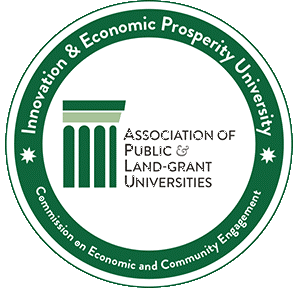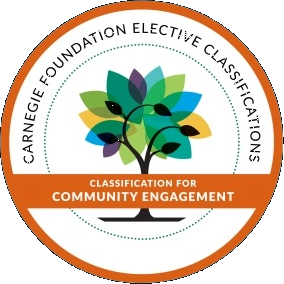The MSU Graduate Student Award for Community Engagement Scholarship is conferred upon up to four graduate or graduate professional students each year for exemplary community-engaged scholarship. This award program is jointly sponsored by the office of the Vice Provost for University Outreach and Engagement and the MSU Graduate School.
Eligibility
To be eligible for this award, nominees must meet all of the following criteria. Nominees are expected to:
- Be enrolled as a Master’s or Doctoral student in any one of Michigan State University’s 14 graduate degree-granting colleges, including the medical schools and law school. Individuals in post-doctoral training at MSU are not eligible for this award.
- Conduct community-engaged scholarship activities while enrolled in graduate study at Michigan State University, though the community engagement activities may occur any place geographically, including internationally. While it is common that the community engagement activities are related to thesis or dissertation work, it is not a requirement. Community engagement conducted as part of research or teaching assistantships, field studies or practicums, work activities, or volunteering are eligible, as long as those activities meet the requirements for this award.
- Collaborate with off-campus community partners (e.g., K-12 schools, nonprofit organizations, industry, government) in one of the following categories of community-engaged scholarship:
- Community-Engaged Research — the discovery and generation of new knowledge, understanding, or insights made in collaboration with community partners, including community-based research, program evaluation, demonstration projects, and assets or needs assessments
- Community-Engaged Creative Activity — the creation of new artistic or literary performances or expressions made in collaboration with community partners, including works of art, documentaries, dance, sculpture, photography, poetry, etc.
- Community-Engaged Teaching and Learning — sharing knowledge with audiences—either formally or informally, for credit or not for credit, including service-learning, civic engagement, summer camps, community workshops, informal science education, museum exhibitions or other interpretation, curated websites, or other curriculum developed in collaboration with community partners
- Community-Engaged Service and Practice — use of knowledge to address a specific short- or long-term community need identified by an individual, organization, agency, or community, including technical service, consulting, policy analysis, or clinical, patient, or diagnostic services
A separate graduate student award for science communication and outreach has been established. Nominations of graduate student projects focused more on a one-way flow of knowledge and resources (from the university to the partners), with a lesser degree of community partner collaboration should be submitted for that award. Applying for both awards for the same project is highly discouraged.
Timeline
- Extended nomination deadline: November 20, 2025, 11:59 p.m. (Eastern)
- Nominees are informed of selection committee decision: January 2025
- Award is conferred at the University Outreach and Engagement Awards Ceremony: March 12, 2026
Nomination Instructions
Nominations should be initiated and completed by students. Faculty, administrators, community partners, or members of the general public are encouraged to assist the student in their application.
Only complete nominations comprised of all of the following elements will be considered:
- Nomination cover page (in the online nomination form)
- Nomination narrative (maximum of 5 pages)
1-5 page text that describes the nominee’s community-engaged scholarship project/activity. It should address:- the theories, conceptual frameworks, or best practices that guided the nominee’s work
- who the community partners are, how the nominee met and collaborated with them throughout the project/activity
- what happened in the project/activity
- what impacts the project/activity has had on the community partners
- what impacts the project/activity has had on the nominee personally and professionally, including reflections or lessons learned
- Nominee’s resume or curriculum vitae
- Nomination letter from the nominee’s major professor or faculty familiar with the nominee’s community-engaged scholarship (maximum of 2 pages)
1-2 page letter that should address the student’s contributions to community-engaged scholarship, including connections the student has made to scholarly foundations; characterization of the student’s relationship with the community partner; impacts to the community or community partner; and impact on the student’s personal and professional learning.
This letter should be specific to the graduate student’s community engagement and not a general letter of recommendation commenting on the student’s overall academic performance, accomplishments, or character.
- Appendices/Supporting materials (maximum of 3 pages)
1-3 pages that illustrate the scope and impact of the work and/or provide evidence of the quality of the collaboration with partners. Could include such materials as: a list of links to newspaper articles, videos, blogposts, or podcasts that mention the work; infographics or other public audience pieces related to the project/activity; photographs from project/activity (taken with permission); an additional letter from a community partner; etc.
Nomination narrative, support letters, and appendices/supporting materials should comprise no more than 10 pages in total. The cover page and c.v. do not count in this 10-page limit.
All nominations must be submitted through the online Graduate Student Award for Community Engagement Scholarship Nomination Form no later than November 20, 2025, at 11:59 p.m. (Eastern).
Questions
Prospective nominees, faculty members, community partners, and interested others may direct questions about this recognition program to Julie Crowgey, crowgeyj@msu.edu.









